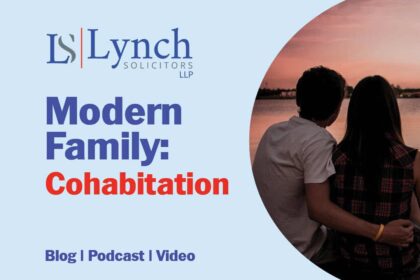
What are the implications for you if you are a cohabitant? How are you protected under the law in Ireland? We look at the issue in this blog and we also have a helpful video and podcast to give you an overview of the issue.
More than a ‘common-law spouse’
The term “common law marriage” is a phrase that is familiar to many people.
It does not, however, represent any legal rights in Ireland. Many couples have in the past, assumed in error that certain rights and responsibilities arose from their relationship.
The Courts have ruled consistently in the past that unmarried couples are not entitled to the special protection that the Constitution gives to married couples. The position had created harsh situations on the breakdown of relationships in terms of custody of children and the division of property.
Podcast: Cohabitation Explained
Gillian O’Mahony talks to Phil Prendergast in this podcast that looks at the issue of cohabitation
The Redress Scheme for qualifying cohabitants
If you can show that you are a qualifying cohabitant, you can apply to the Court under the redress scheme and the court has a great range of powers to make arrangements about various assets – e.g property or pension funds. In this sense, it operates much like it would in a divorce or legal separation situation.
The court can also order maintenance for the qualifying cohabitant. Child maintenance, which has long been covered by areas of law other than the 2010 Act remains as it was prior to the Act’s commencement.
Child maintenance has long been covered by areas of law.
If a qualifying cohabitant’s other half dies, then they can make an application for provision from their other half’s estate if they haven’t been provided for.
Video: Prenup, Cohabitation & Separation Agreements
Lynch Solicitors for Information Purposes Only
A prenuptial agreement for cohabitants
What a lot of people are not aware of is the option of a cohabitation agreement which is a lot like a pre-nuptial agreement.
It sets out the terms on which a couple will live together and what will happen if they break up.
It is most often considered by those who have divorced previously and know the importance of such agreements but is available for anyone to enter. Legal advice is important however as the agreement needs to be correctly set out in writing with full disclosure.
Read our previous blog on what makes somebody a ‘qualifying cohabitant’


If cohabitants can claim assets under the redress scheme, can tax credits also be transferred, once qualified, or subsequently under redress?
I cannot give a definitive answer on that one – how did the tax credits arise in the context of cohabitants?
I’m curious about the situation of tax credits and cohabiting couples as well, since I’m part of one and despite being the sole earner in the household, there appears to be no way to merge tax credits between myself, my partner and our two young kids. This seems terribly unfair, so I’d love to hear if the situation is actually not like this.